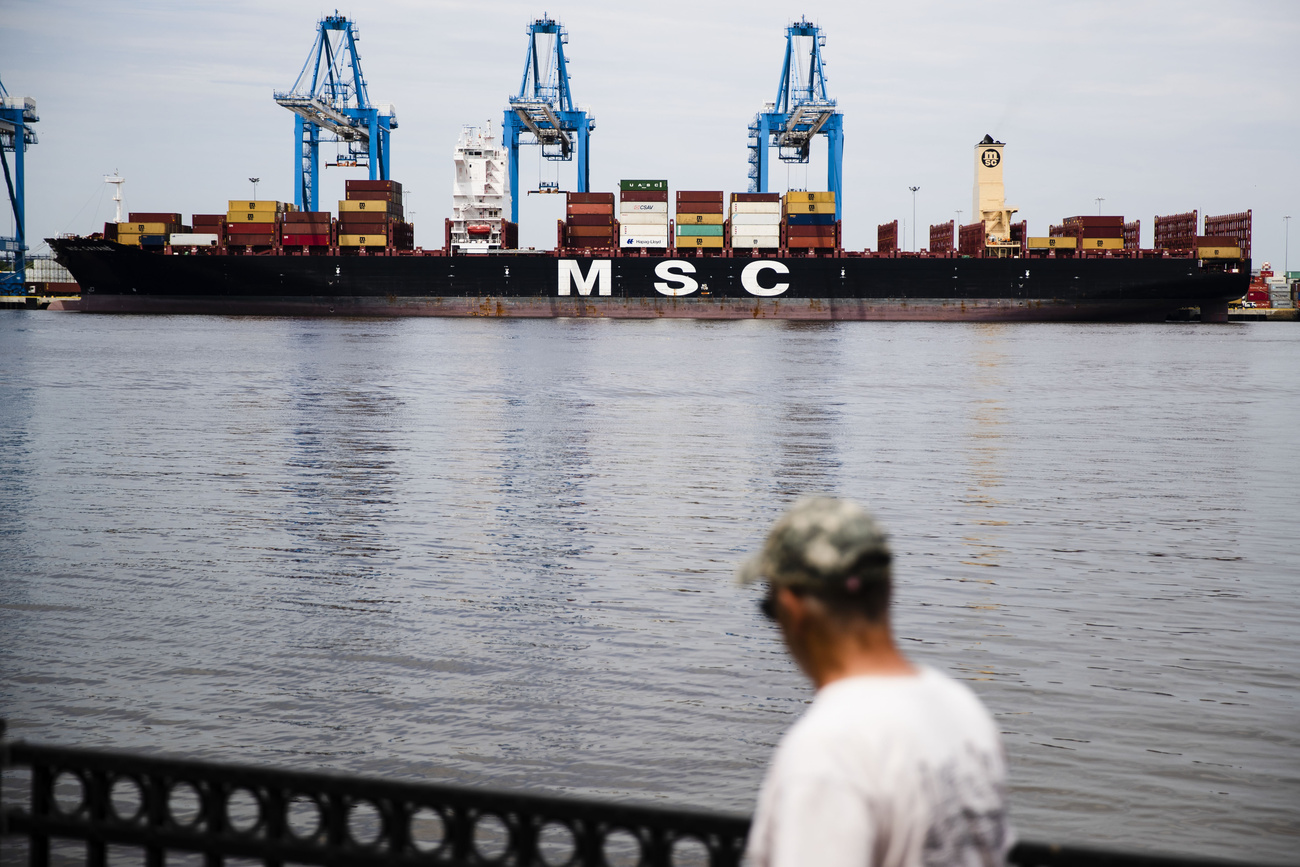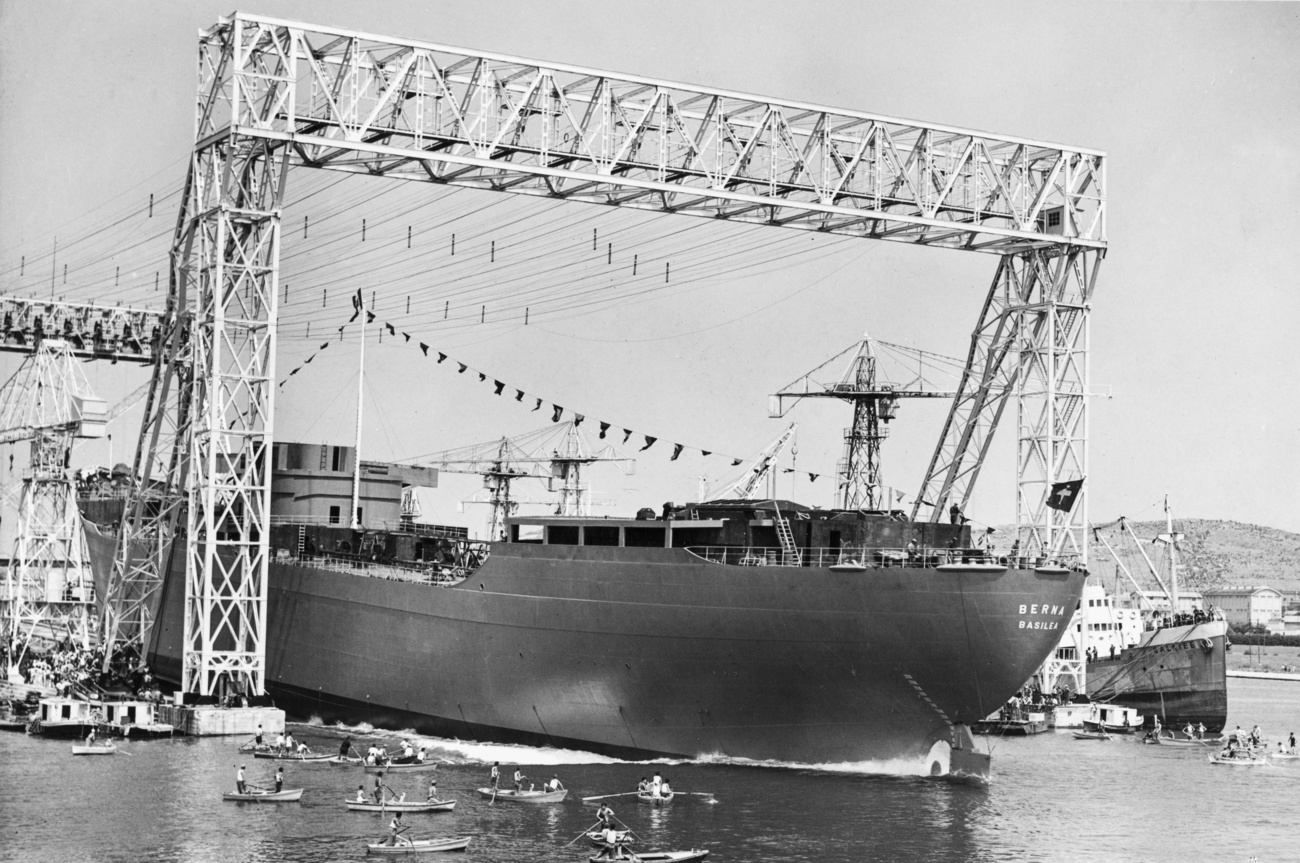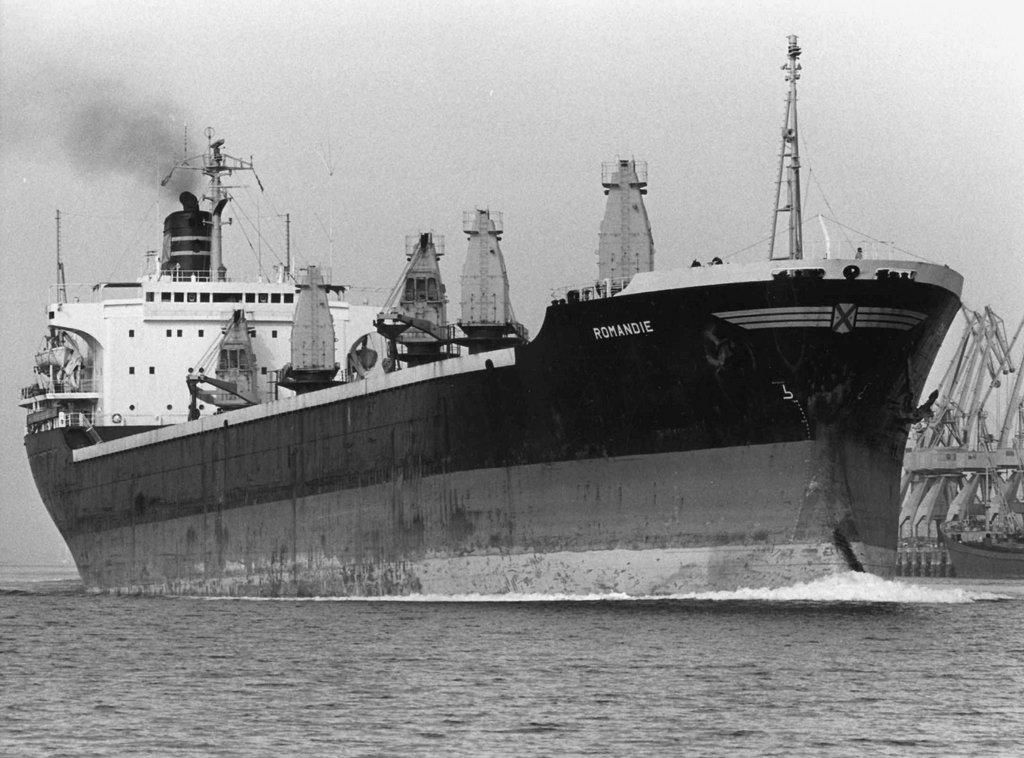‘Movie-plot’ cocaine case highlights shipping industry drug problem

In a rare conviction, the first mate of a ship chartered by a Switzerland-based company was recently sentenced to seven years in prison in the United States after authorities found a record-breaking 20 tons of cocaine on board. The case is one of many highlighting the vulnerability of the global shipping industry — in which Switzerland is a key player — to criminal activity by drug traffickers.
On June 17, 2019, US law enforcement agents boarded a shipping vessel when it arrived at the Packer Marine Terminal in Philadelphia and seized 19.75 tons of cocaine with a street value of over $1 billion (CHF920 million). It was one of the largest drug seizures in US history and prompted the company to invest millions in security upgrades.
The vessel in question – the MSC Gayane -– was part of the fleet of the Geneva-based Mediterranean Shipping Corporation, which handles about 16% of the world’s seaborne trade, the second-most after Danish-based Maersk, according to a constantly updated ranking of the 100 largest shipping operators.
A spokesperson for the US Attorney’s office told swissinfo.ch that investigations in the US case are ongoing but the company is not facing charges. A total of eight crew members were arrested and plead guilty to conspiracy to possess with intent to distribute cocaine.
The sentence against MSC Gayane first mate Bosko Markovic was handed down on June 10, according to unsealed court documents.
“A smuggling scheme of this magnitude would likely not have been possible without the [first mate],” said assistant US attorney Jerome Maiatico. “His role was necessary.” A first mate is generally responsible for a ship’s cargo and deck crew.
The smuggling case was unprecedented in scale and US law enforcement response. Customs and Border Protection temporarily seized the vessel — a ship measuring roughly two city blocks in length— and it was later released on a $50 million bond. MSC temporarily lost its preferential American customs inspection status over the case.
The subsequent investigation, the details of which have emerged in sentencing documents, uncovered a clandestine drug trafficking operation that US authorities say “read like a movie plot”. Crew members used encrypted phones to communicate with drug suppliers in South America. The ship’s crane was used to hoist cargo nets full of cocaine onto the vessel from speedboats that approached at night.
Widespread problem
Such incidents are not isolated to MSC. Drug trafficking is a headache for all major container lines, including Maersk. In 2019, UK authorities seized 1.3 tons of heroine from a Maersk-operated ship. Last year, Mexican authorities found 102.5 kilos of cocaine on a Maersk vessel.
United Nations experts note the illicit drugs trade has been on the rise in the five-year period leading up to 2019 and that drug barons appear to be taking larger risks, sending more cocaine at one time. The Americas had 17 high-profile drug seizures in 2020, followed by Europe with 13, according to the International Chamber of Shipping. Most of the cases involved cocaine hidden in cargo as varied as rice, bananas and coal.
“The illicit drug trade is disruptive and costly to shipping,” says John Stawpert of the International Chamber of Shipping, which represents more than 80% of the world’s merchant fleet and issues regular guidelines on combatting drug trafficking. He declined to comment on the MSC Gayane case directly.
“Regrettably, what accounts for its existence is the demand for supply,” Stawpert told SWI swissinfo.ch. “Nine out of ten goods in your home were transported by sea, and because of this scale and scope it is an attractive mode for drug traffickers, despite government’s and industry’s ongoing efforts to curb this crime.”
Cocaine is the second-most consumed drug in the European Union after cannabis products.
Antoine Vella, a researcher focused on cocaine trafficking at the United Nations Office on Drugs and Crime (UNODC), points out “the use of merchant vessels including containers for movement of cocaine has become the primary mode for traffickers targeting the European market”. The MSC Gayane had been due to dock at the Dutch ports of Rotterdam, Antwerp and France’s Le Havre.
Vella notes there are many ways that drugs can be planted on board a vessel without a company realising. The most common is the “rip-on, rip-off” method in which containers are unsealed and then resealed to smuggle drugs, usually in the dock area at the port of departure. Complex webs of criminal organisations and corruption by port and other authorities add to the problem.
The Covid-19 pandemic with its quarantines and restrictions has complicated efforts to tackle the issue. Consumer demand has led to a surge in container shipping, according to the United Nations Conference on Trade and Development, which notes in an April policy brief that “container freight rates have reached historical highs”.
What is Switzerland’s role?
Landlocked Switzerland is home to a constellation of shipping companies who find it convenient to be based in commodity trading hubs like Geneva. Swiss authorities, however, only have jurisdiction over cases involving vessels travelling under the country’s flag. The MSC Gayane was registered in Liberia.
“Switzerland does not have ports on the oceans, and it cannot prevent its companies’ vessels being flagged under other countries, so it is limited in how it can directly intervene,” says Vella. “In terms of shipping good practice, there should ideally be a strong link between the flag of the country and the ship.”
For its part, the Mediterranean Shipping Company, an Italian family-owned business headquartered in Geneva, says it was a victim of criminal conspiracy conducted by its crew in the MSC Gayane case. In a March 29 victim impact statement to a Philadelphia court, the shipping giant described the incident as an “unwanted and undeserved stain” on its record.
The MSC fleet includes more than 350 company-owned or bareboat chartered vessels, as well as 210 time-chartered boats, according to the March statement. These are staffed by almost 9,000 crew members at sea at any given time. MSC vessels call on approximately 500 ports over about 200 trade routes and carry more than 20 million containers annually around the world.
In the impact statement, MSC also noted its robust anti-smuggling policies and says it conducts vessel searches for drugs upon leaving a port as well as before entering a US port. It pointed out that visa requirements gave US authorities an opportunity to conduct background checks of the crew members. The company said it cooperates closely with US law enforcement authorities.
Following a series of drug-related incidents, the shipping company also disclosed plans to make $100 million worth of security enhancements by 2024. Also in 2019, US authorities found half a ton of cocaine on board MSC Desiree and 1.5 tons of cocaine on the MSC Carlotta. Earlier this year, Australian authorities seized 200 kilograms of cocaine aboard the MSC Joanna.
An MSC spokesman declined to comment on the MSC Gayane case but stressed the company has “zero tolerance for the abuse of its services through criminal activities, including drug trafficking” and that it implements robust security measures including cameras and fences, as well as providing a whistleblowing process for seafarers to report suspicious activities.
The Swiss Shipowners Association, which has seven members including MSC and represents more than three-quarters of the fleet operated from Switzerland, declined to comment discuss the challenges faced by the industry when it comes to drug trafficking. The Swiss Trading and Shipping Association says companies try to hire professional crews to avoid problems.
More government oversight?
Swiss criminal law expert Mark Pieth believes the Alpine nation’s government should play a larger role in overseeing the shipping industry. He says the concealment of illegal goods is just one issue facing the sector, with others including environmental and labour abuses. Pieth says those smuggling drugs aboard vessels rarely get caught, and that a sting operation like the one orchestrated by US authorities is even more rare.
“There are these extremely short turn-around periods in port which impede law enforcement from finding out,” explains Pieth, who teaches at Basel University and is writing a book about the shipping industry. “They would [only] find out if they are tipped off, if there is an undercover operation, or simply by chance.”
Law enforcement expert Bob Van den Berghe of the UN Office on Drugs and Crime says that only 2% of the 750 million containers moved around the world every year are inspected. Consumer demand amid the Covid-19 pandemic has led to a surge in container shipping, according to the United Nations Conference on Trade and Development, which notes in an April policy brief that “container freight rates have reached historical highs”.
The Swiss government, meanwhile, says it is doing its part to address drug trafficking through participation in international bodies such as the International Maritime Organization and Interpol. It has ratified the Convention for the Suppression of Unlawful Acts against the Safety of Maritime Navigation and implements the International Ship and Port Facility Security Code, as Switzerland’s Rhine ports provide a connection to the sea.
Incidents like the MSC Gayane are costly and embarrassing for the shipping industry, says Pieth. But he admits there is only so much that companies can do to protect themselves from criminal enterprises given the nature of container shipping and the complexity of supply chains involved.
“The question is can they be more attentive,” he asks. “They can be careful in hiring. But they can’t really prevent their staffs from getting bribed by drug barons.”
Switzerland accounts for one-fifth of global maritime trade movements and has the largest commercial shipping fleet among landlocked countries, according to STSA. The fleet includes 18 Swiss-flagged seagoing commercial vessels and more than 800 ships operated by companies based in Switzerland. When it comes to global maritime trade, Switzerland ranks fifth in Europe and 11th worldwide. The nation’s commercial fleet is comparable to that of France and surpasses that of the Netherlands. Shipping and trading activities account for 4.8% of Swiss GDP in 2019.

In compliance with the JTI standards
More: SWI swissinfo.ch certified by the Journalism Trust Initiative















You can find an overview of ongoing debates with our journalists here . Please join us!
If you want to start a conversation about a topic raised in this article or want to report factual errors, email us at english@swissinfo.ch.